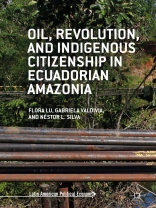This book addresses the political ecology of the Ecuadorian petro-state since the turn of the century and contextualizes state-civil society relations in contemporary Ecuador to produce an analysis of oil and Revolution in twenty-first century Latin America. Ecuador’s recent history is marked by changes in state-citizen relations: the election of political firebrand, Rafael Correa; a new constitution recognizing the value of pluriculturality and nature’s rights; and new rules for distributing state oil revenues. One of the most emblematic projects at this time is the Correa administration’s Revolución Ciudadana, an oil-funded project of social investment and infrastructural development that claims to blaze a responsible and responsive path towards wellbeing for all Ecuadorians. The contributors to this book examine the key interventions of the recent political revolution—the investment of oil revenues into public works in Amazonia and across Ecuador; an initiative to keep oil underground; and the protection of the country’s most marginalized peoples—to illustrate how new forms of citizenship are required and forged. Through a focus on Amazonia and the Waorani, this book analyzes the burdens and opportunities created by oil-financed social and environmental change, and how these alter life in Amazonian extraction sites and across Ecuador.
Tabella dei contenuti
1. The Road to the Revolución Ciudadana .- 2. In and Out of the Shadows of Citizenship .- 3. Habits of Oil Rule .- 4. The Problem of Poverty .- 5. Oil as Risk in Waorani Territory .- 6. Neoextractivism and Its Contestation .- 7. Human Rights and People in Voluntary Isolation .- 8. Oil Flux and Unrest.
Circa l’autore
Flora Lu is Associate Professor of Environmental Studies and Provost of Colleges Nine and Ten at University of California, Santa Cruz, USA.
Gabriela Valdivia is Associate Professor of Geography at the University of North Carolina at Chapel Hill, USA, and Fellow at the UNC Institute for the Arts and Humanities.
Néstor L. Silva is Doctoral Candidate in the Department of Anthropology at Stanford University, USA.












